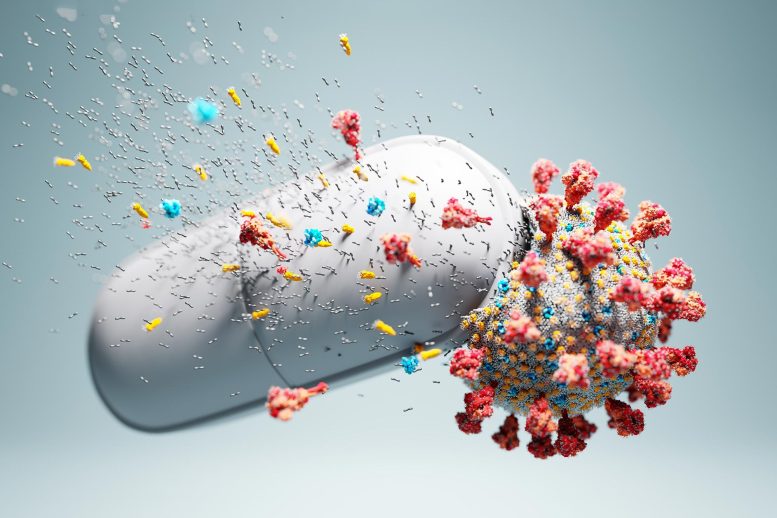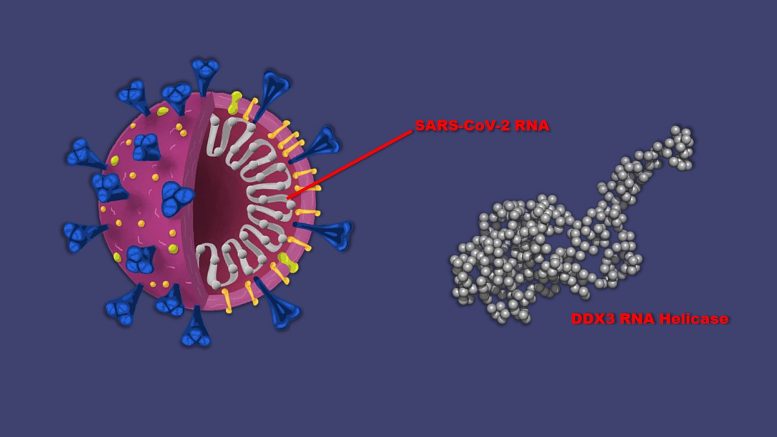
According to research conducted by Johns Hopkins Medicine, multiple variants of the SARS-CoV-2 virus can be blocked from replicating by the small molecule inhibitor RK-33.
An efficient method of combating SARS-CoV-2, the virus that causes COVID-19, may be possible based on findings from a recent study by a research team led by Johns Hopkins Medicine that avoids the issue of waning immunity that is frequently noticed when current vaccines address emerging COVID variants. The technique stops the virus’s ability to take over a host cell’s “genetic manufacturing plant” and replicate itself by using a tiny molecule inhibitor called RK-33. This molecule, which has a size of around 1 nanometer, inhibits certain interactions between proteins.
“To date, COVID-19 vaccines have relied on preventing the binding of a SARS-CoV-2 surface protein — called the spike protein — to host cells and enabling infection, but if the spike protein changes with new variants, a vaccine’s effectiveness may be weakened,” says study senior author Venu Raman, Ph.D., professor of radiology, oncology, and pharmacology at the Johns Hopkins University School of Medicine. “In contrast, our study shows that RK-33’s antiviral capability is unaffected by spike protein mutations and remains consistent across four SARS-CoV-2 variants.”
The research was recently published in Frontiers in Microbiology.

RK-33: A Broad-Spectrum Antiviral Agent
Raman and his colleagues have been researching the connection between a protein called DDX3 and cancer for a number of years. DDX3 is an RNA helicase, a protein that unwinds the double-stranded RNA that controls many tumor cells, allowing the RNA’s genetic code to be read (or translated). This results in the formation of new cancer cells and the malignant expansion of the disease. Studies conducted by Raman’s group and others have led to the belief that RK-33, a DDX3 inhibitor created in the Raman laboratory, may limit the development of cancer by preventing RNA from unwinding for translation.
The DDX3 protein has also been demonstrated to enhance the infectivity of numerous RNA viruses, including HIV and respiratory syncytial virus (RSV). RK-33, a DDX3 inhibitor that has shown remarkable promise in the battle against cancer, is thus being carefully examined for use as a broad-spectrum antiviral agent.
“We know that many RNA viruses usurp the DDX3 helicase function of the host cell to facilitate their own replication,” says Raman. “When scientific studies revealed that small concentrations of RK-33 blocked replication and limited infectivity by human parainfluenza type 3 virus, RSV, dengue virus, Zika virus and West Nile virus — and potentially, HIV — our team decided to see whether RK-33 could work on SARS-CoV-2 as well.”
RK-33’s Antiviral Capability Against Multiple Variants
Along with testing RK-33’s impact on SARS-CoV-2 infectivity and reproduction, the researchers extended their study to determine if the inhibitory action observed was limited to specific variants of the virus or would be effective against multiple variants. They used RK-33 to target DDX3 in laboratory cells infected with four variants of SARS-CoV-2 — the original virus and the alpha, beta, and delta variants.
“Our results indicate that for the four SARS-CoV-2 variants we tested, RK-33 treatment of infected cells showed significant reductions in the viral load [the number of virus particles in a defined sample size], as much as a thousandfold,” says Raman. “Consistent with this finding, we saw a downregulation [reduction in production] of most SARS-CoV-2 proteins and genes, including the protein transmembrane serine protease 2 [TMPRSS2], which we know strongly participates in the infectivity and spread of coronaviruses.”
Raman adds that not only did RK-33 work with four different SARS-CoV-2 variants, but the protein’s antiviral activity is also unaffected by the mutations that created each of them.
Potential for RK-33 to Overcome Spike Protein Mutations
“Vaccines designed against the spike protein of one SARS-CoV-2 variant may not be as effective if a new variant has a mutated spike protein,” he explains. “The ability of RK-33 to inhibit DDX3’s unwinding of viral RNA for translation is independent of the spike protein, so it should remain effective against most variants.”
Currently, Raman and his team are looking at RK-33 as an antiviral against the omicron variant of SARS-CoV-2. The researchers hope to publish their findings later this year.
Reference: “RK-33, a small molecule inhibitor of host RNA helicase DDX3, suppresses multiple variants of SARS-CoV-2” by Farhad Vesuna, Ivan Akhrymuk, Amy Smith, Paul T. Winnard Jr, Shih-Chao Lin, Lauren Panny, Robert Scharpf, Kylene Kehn-Hall and Venu Raman, 25 August 2022, Frontiers in Microbiology.
DOI: 10.3389/fmicb.2022.959577
The research was supported by National Institutes of Health grant R01CA207208 and the Flight Attendant Medical Research Institute.
Raman holds a patent on the composition of RK-33. The other study authors report no conflicts of interest.
Never miss a breakthrough: Join the SciTechDaily newsletter.
1 Comment
Or just take Ivermectin.